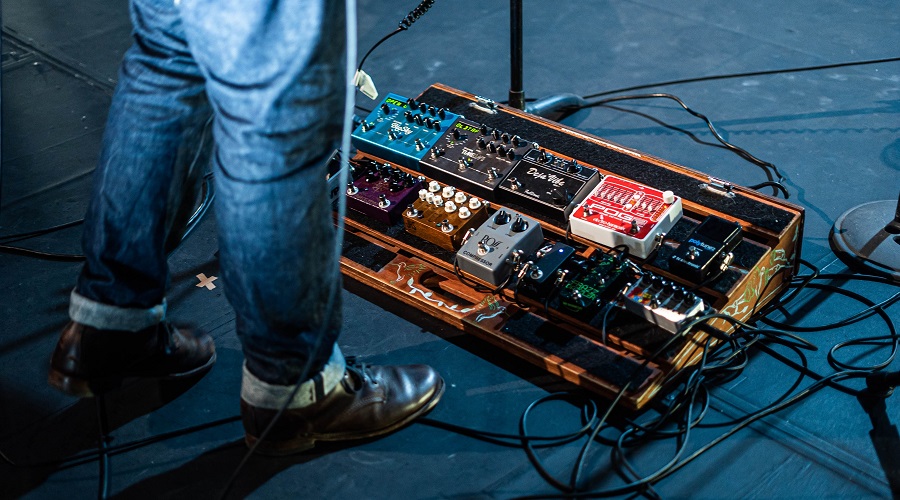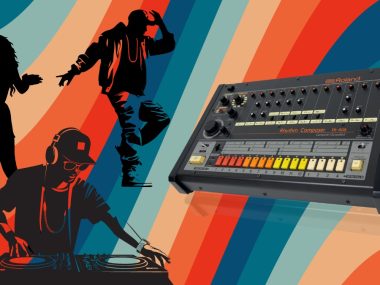Dr. Dre, Sir George Martin, and Quincy Jones are famous music producers in the music industry for their significant impact and contribution to different music genres’ evolution.
So, what is music production? What is the process of music production, and what do music producers do?
Music production is the process of creating and manipulating music, so it can be distributed and enjoyed by the fans. All the recorded music that we currently listen to is made available, thanks to the minds and talents of music producers.
Keep on reading to learn more about music production and how it’s done.
What is Music Production?
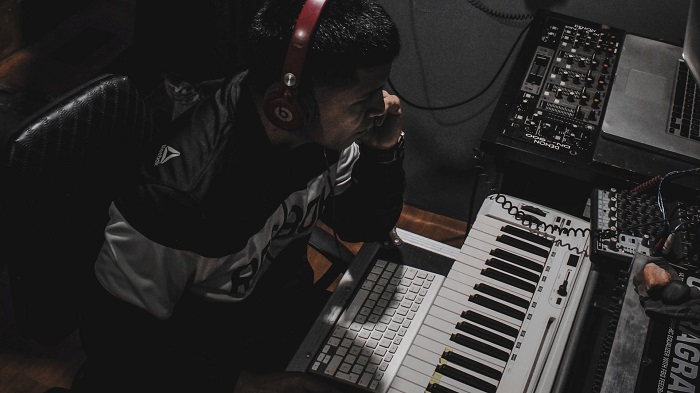
No matter how famous or underground the artist is, distributing the music so it’s available to fans is the job of a music producer.
This is why music production involves every step that is related to creating, recording, producing, and distributing a track.
It starts from the first steps of writing the lyrics and creating the melodies to mastering the track’s final version before distributing it to various channels.
Regardless of the music genre or the style of the artist, music production is a crucial process. It’s a technical and professional activity that is best handled by a creative person who works in the business.
What is a Music Producer?
A music producer has to develop a set of skills, including having a good ear for music and knowing how to contact several people in the industry to distribute the music.
He or she should also have deep music knowledge, sound project management skills, and even leadership skills to be able to handle the work.
Also known as a record producer, a music producer is a skillful person who assists the artist with the recording project in order to bring their artistic vision to life.
Moreover, they should provide guidance along the way, starting from the very beginning when the artist starts to write the music.
The efforts of the music producer can’t be seen, but they’re felt along every step of the music production process. Without this person who brings all the little pieces together, the project might not come to life or might not be as successful.
A music producer micro and macro manages the process of creating music by focusing on the details and the big picture until the song or music piece is created, heard, bought, and shared by the fans.
So, in a way, the music producer resembles the fuel that drives the whole process forward and keeps it going.
What are the Steps of Music Production?
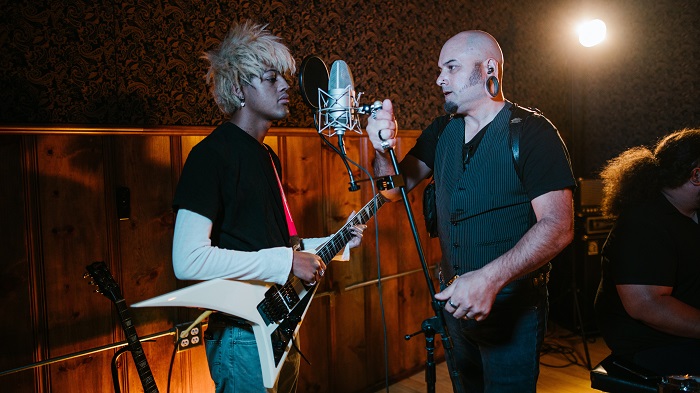
When the artist has a musical idea, they can either start working on it or discuss it with the music producer and band members.
A musical idea can be anything from a verse to a catchy melody. After working and editing this idea, the artist can start working on their final product, which involves the full lyrics, the musical arrangement, and all the tools needed to bring this idea to life.
This process is called music production and is made up of the following steps.
1. Getting the Idea
This is the most creative and could be the most spontaneous part of the project, as the artist can be moved by a scene in a movie or have a vivid memory of a melody they listened to in the past. Any idea can be the core and basis of a new song or track when the artist works on it.
The producer then discusses the idea with the artist and sees if the song presents the right raw material that can later be refined to produce a successful record.
For example, the producer might decide on which band members will sing different verses or the music arrangement of the song.
2. Recording
After having a clear vision of what needs to be done and how it will be done, the producer will decide on the proper recording studio, equipment, and personnel.
The producer will choose the appropriate hardware devices and might even talk with the sound or mixing engineer about the software options to create the song in a way that fits the overall vision. It’s the producer’s job to make sure that everything is balanced and in harmony.
3. Editing
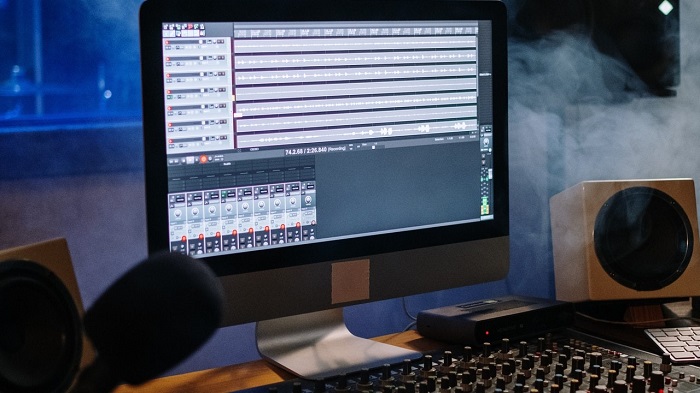
After recording music, the producer will edit the music in multiple ways. This involves recording the same track using different arrangements or deleting some verses if they don’t fit with the overall project.
Although audio editing to create loops or change the volume or speed is the sound engineer’s job, the music producer will have a great input in every decision made.
4. Mixing
The producer will discuss different details to help the sound engineer and other technicians make the right decisions when it comes to mixing the track. This involves bringing all the different pieces together to create the best version of the song.
5. Mastering
After adding the different effects to the song during the mixing process, the producer will take some of the most crucial decisions during the final stage of producing music.
The mastering process involves assembling all the different tracks to create a digital file or CD with the final adjustments and edits. This final version is the one that the record label will receive, market, and distribute.
Some technical decisions are taken during the mastering stage, like adjusting the volume of each song to make sure that all the songs are flowing smoothly.
Moreover, the music producer can decide on the singles with the record label or arrange the songs in the album to tell a story.
What are the Roles of a Music Producer?
The music producer’s roles are vast and diverse, and this can be unclear, especially to new artists and those who are taking their first steps in the music industry.
A producer does everything from taking calls, coordinating meetings, listening to demos, signing artists to labels, co-writing songs, deleting lyrics, cooperating with other artists, and handling disputes between band members.
A music producer also handles the financial aspects of the artist’s life. This includes managing contracts, handling disputes between the artist and the record label, deciding on live performances and marketing deals.
It’s their job to create the best situation that allows the artist to benefit from their creativity. Here are the most critical roles of the music producer.
Planning
The first step in creating music is related to planning to release a track. A music producer either receives a demo from an aspiring artist or sits with the artist to discuss their vision.
During this period, the producer can make a suggestion or help the artist find someone to help create their music. For example, they can match a good instrumentalist with a talented vocalist or add a new member to an existing band.
Bringing people with the same vision together can also be the job of a producer. He or she might meet solo artists while they’re roaming the clubs and other places where these talented people perform, then convince them to join other artists, so they can create a successful band.

After bringing the artists together or committing to a single artist, the producer usually has input about the kind of music produced. This involves discussing the lyrics with the artist, talking about the kind of music delivered, and which songs to include in the album.
Many aspiring and more experienced artists believe in the producer’s vision, especially if they have seen them managing the work of others successfully.
But even if the producer is less experienced, they would still help the artist understand a lot about the music industry and the market.
For this reason, lots of producers were solely responsible for introducing a new style to the music world.
For example, Paul Epworth worked with Adele to produce the exceptional pop ballad, “Rolling in the Deep, “that shows the outstanding balance between different instruments.
Another example is Louis Bell, who worked with Post Malone and Miley Cyrus, blurring the lines between pop and hip hop to create several successful songs.
Some producers are also successful performers, like Missy Elliott. In addition to her own hits, Elliot was the mastermind behind the success of several names in the R & B scene, including Monica and Aaliyah, by shifting to more soul-warming melodies with their successful hits.
Scheduling
The producer’s job is to manage the work of the artist, so he or she can focus on creating their music. This involves managing their time and schedule, so they can work according to a specific plan.
The producer will schedule record sessions, meetings with record labels, meetings with other artists for collaborations, and arrange appearances on radio and TV channels.

All these activities grant the artist the needed exposure, so he or she can establish their status among other hard-working artists.
In most cases, artists can be overwhelmed by the non-artistic part of creating music, and some of them can face problems with time management. This is why having someone who is responsible for making a plan and following it up will make things flow smoothly.
Budgeting
The music producer should help the artist arrange a recording session within the appointed budget. This involves choosing the right recording studio and picking the appropriate musical instruments and equipment to perform and record the song the way it should be.
Focusing on the technical aspects of the recording process is a job that is better left to the producer, even if the artist has a special request or vision. In some cases, the artist’s vision isn’t the most financially feasible one, especially if they’re still new to the industry.
In this sense, it’s safe to say that the music producer’s job involves allocating different resources to achieve the best outcome.
By following the plan set up by the music producer, the artist will be able to submit the completed project to the record label on the agreed-upon date.
However, not sticking to the completion date can put the artist in trouble since they’re legally committed to delivering the project according to a contract.
During this time, the artist will focus on creating the music, while the music producer will handle all the hurdles that might slow down the process or affect the quality of the final outcome.
Even if the album is an indie or low-budget project that is handled to a great extent by the artist, having a music producer oversee the whole process can be a big plus.
They can help the artist stay on track by solving technical problems like repetitive remixing or further overdubbing, as these issues can delay or even prevent the artist from ever releasing their project.
Shaping and Creating
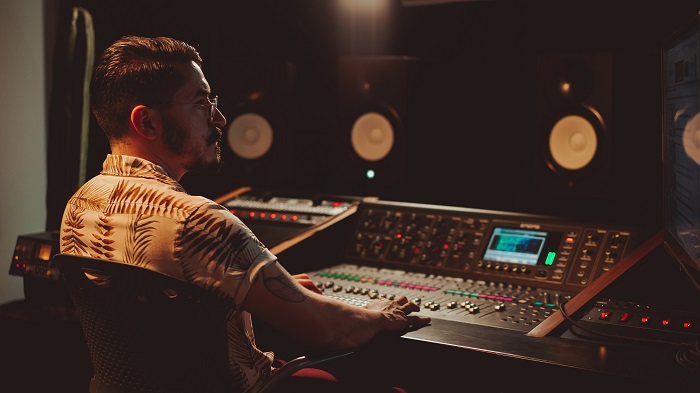
Some artists are pretty talented but have no idea of how to present their music in an acceptable shape. However, since the music producer is a professional, they have a good idea of the kind of music that can attract the attention of fans.
This doesn’t mean that the producer can decide for the artist, although they sometimes have considerable input. However, the music producer usually takes the raw material of the artist’s vision and then transforms it into a complete project when it’s finally recorded.
During this process, the producer will pay attention to several artistic and commercial aspects. The music produced should express the artist’s vision, but it should also be able to reach the target audience.
The music producer gathers the bits and pieces and works on them to make them more appealing. For example, they might suggest deleting or adding a verse, going for a different remix, or changing some of the lyrics to make them more appealing or appropriate.
At the same time, the producer will help the artist stick to their artistic persona. They can help them find and work according to a specific genre to show their full potential.
Supervision
The mutual understanding between the artist and the music producer has a significant impact on the success of music production from the beginning till the end.
The producer has the skills to identify real talent and motivate the artist or artists until they’re able to deliver the best performance.
They will analyze the music and help the artist identify their points of strength, so they can create music to motivate the listeners.
This is why the artist should trust the producer and pay attention to their emotional response. After all, they’re part of the audience that they’re creating this music for.
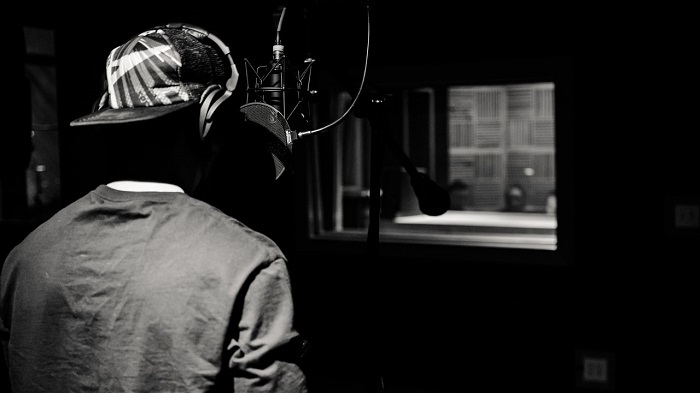
Therefore, the artist should trust the producer’s vision regarding a violin solo or the pronunciation of a specific word.
They’ll help create the appropriate level of energy to help the artist make music that the fans will love and appreciate.
Although the artist might be more talented than the producer, the music producer is usually the one who makes the final decisions when it comes to the recording process. This is why mutual trust and understanding are of great importance.
Create Balance
Artists can be overwhelmed by the technical aspects of the recording process, so the producer will help create the needed balance so that the artist can stay motivated.
During recording sessions, even the most professional and experienced artists can feel overwhelmed, anxious, or stressed. This is why the producer’s job involves maintaining the right vibe to help the artist perform and excel.
A successful music producer can help calm down an anxious artist by making them feel that they’re just playing music in the studio and that they’re recording the results.
This can drastically decrease the level of stress that the artist naturally feels when they know that they have to finish a track by a deadline.
Although the producer should stick to a plan and be fully aware of the purpose of the recording session, they can keep these details to themselves instead of stressing the artists about these technical aspects.
When the artist is handling all these details by themselves, they’ll be unable to focus on the creative part of the recording process because they’re apprehensive about the legal aspects of their contract and the financial responsibilities if the recording session isn’t successful.
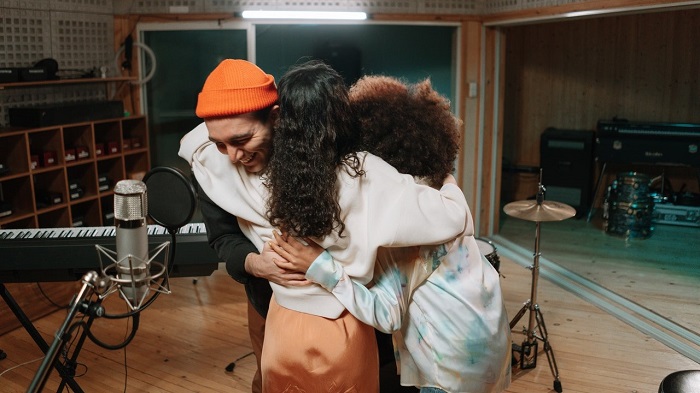
At the same time, the music producer usually acts as a mentor or guardian, so they can even help the artist with some of the personal problems they face while creating music.
They can help them see new solutions for their problems, make them understand how to handle some of their personal issues, and successfully handle disputes between band members that naturally arise during stressful recording sessions.
In order to maintain a positive attitude throughout the music production process, the producer can do several things.
- The music producer should always share positive thoughts with the artist or band members. Continuously encouraging them and affirming that they’re getting close to achieving their goal will help the artist work harder.
- As a leader and a coach, the music producer should inspire the artist and help them when self-doubt kicks in. They should be well-prepared for the possibility of the artist becoming overwhelmed, tired, and discouraged and should be aware of their emotional and physical needs.
- The artist should trust the producer, so they know that they’re on the same frequency. When this happens, they will be able to work better because they know that they’ve got someone they can fully trust.
- When the artist loses motivation or starts to feel discouraged, the music producer should help them keep moving. They can help the artist maintain the right momentum to work according to the schedule.

